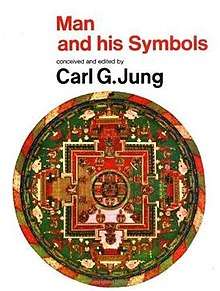Man and His Symbols
Man and His Symbols is the last work undertaken by Carl Jung before his death in 1961. First published in 1964, it is divided into five parts, four of which were written by associates of Jung: Marie-Louise von Franz, Joseph L. Henderson, Aniela Jaffé, and Jolande Jacobi. The book, which contains numerous illustrations, seeks to provide a clear explanation of Jung's complex theories for a wide non-specialist readership.
 Cover of the first edition | |
| Editor | Carl Jung |
|---|---|
| Language | English |
| Subjects | |
Publication date | 1964 |
| Media type | Print (Hardcover and Paperback) |
Jung wrote Part 1, "Approaching the Unconscious," of the book in English.
The last year of his life was devoted almost entirely to this book, and when he died in June 1961, his own section was complete (he finished it, in fact, only some 10 days before his final illness) and his colleagues' chapters had all been approved by him in draft. . . . The chapter that bears his name is his work and (apart from some fairly extensive editing to improve its intelligibility to the general reader) nobody else's. It was written, incidentally, in English. The remaining chapters were written by the various authors to Jung's direction and under his supervision. John Freeman, editor, page viii of the Introduction, Dell Publishing, 1968
A German-language edition of the book, Der Mensch und seine Symbole, has been published by Patmos Verlag.[1] The illustrations included in this edition are in color.
Editions
The book has been reprinted several times since initial publication, including:
- ISBN 0-385-05221-9 (Doubleday hardcover, 1964)
- ISBN 0-440-35183-9 (Dell Publishing paperback, 1968)
- ISBN 0-330-25321-2 (Picador paperback, 1978)
See also
References
- Jung, C.G. (2012). Der Mensch und seine Symbole (18th ed.). Ostfildern, Germany: Patmos Verlag. ISBN 978-3-8436-0294-5.
External links
- Archive for Research in Archetypal Symbolism: A pictorial and written archive of mythological, ritualistic, and symbolic images from all over the world and from all epochs of human history.